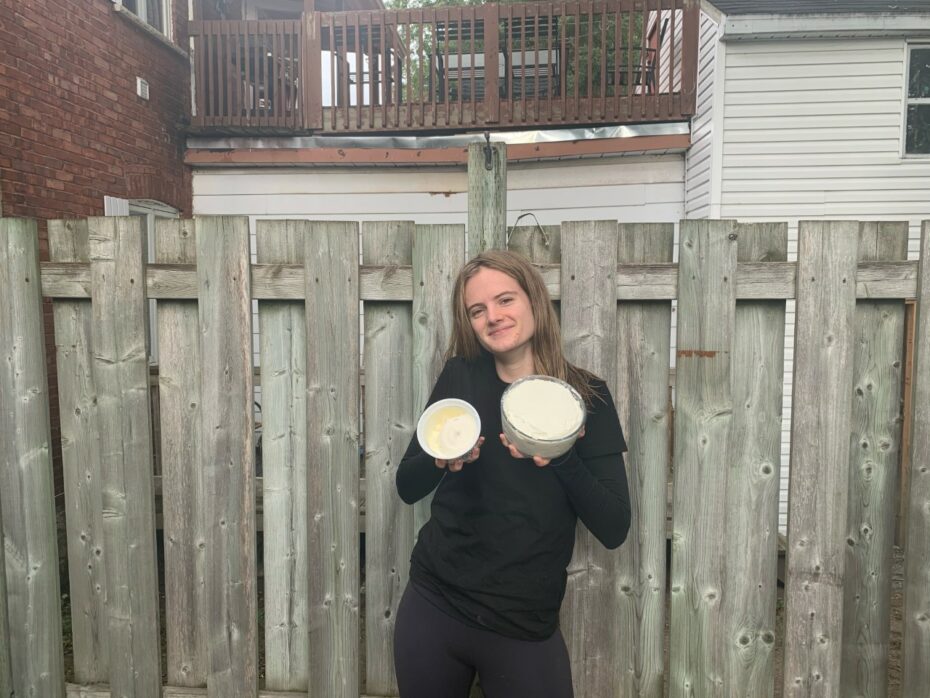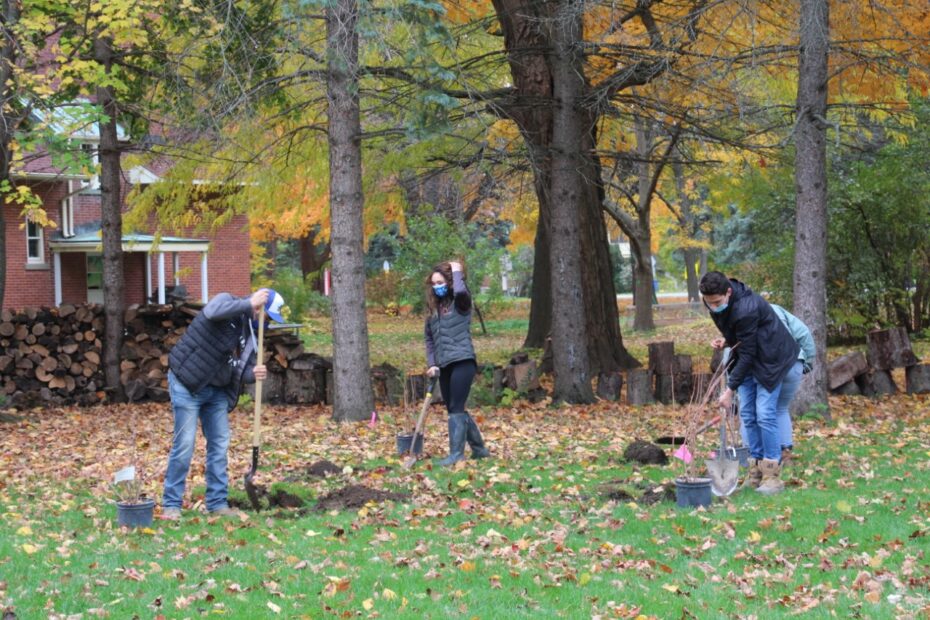Faced with strict COVID-19 government protocols that have largely precluded in-person learning for much of 2020 and into 2021, professors and course lecturers across McGill’s campuses have found creative ways to connect with their students and optimize their new e-learning environments. The shift to remote delivery can be especially challenging for classes that involve laboratory or field work. But a look at two Mac campus courses, in Food Science and Farm Management and Technology, show how instructors and students are rising to the challenge.
Thinking outside – and inside – the box
Jennifer Ronholm, Food Science professor in the Faculty of Agricultural and Environmental Sciences, was forced to rethink her approach to labs when it came to equipping her fourth-year students with the supplies required to successfully complete their at-home food fermentation experiments. Although it would prove challenging to deliver materials to students in all corners of the world, Ronholm decided it was the only logical approach.
“In August, we designed and assembled a course pack that we sent out to all the students containing the materials and instrumentation to make wine, sauerkraut, cheese, yogurt and to observe food spoilage,” she explains. “The course actually lends itself quite well to remote learning because most of the things you would do to demonstrate fermentation or spoilage can and do happen in peoples’ houses.”
And although shipping equipment directly to students seemed straight-forward enough, the process faced its own unexpected hiccups, particularly for packages destined for those in China, Mexico and India. “Unfortunately, parcels were held up at a couple of international borders. It was just weird what people lost from their kits… one student had their grape juice, bacterial culture for the cheese and a hydrometer removed. It was unfortunate, but we did our best,” Ronholm says.
Thankfully, the lack of materials didn’t detract from students’ ability to learn, as they were encouraged to share their experimental triumphs and failures with each other – an approach that Ronholm’s students appreciated.
“What I like about this course is that the goal is not for your experiment to go perfectly, it’s just to learn from the process,” says Food Science major Arusha Fleming. “We were encouraged to connect with our classmates, talk about and compare our results. That’s been really beneficial.”
And when it comes to the online labs, students were able to follow in tandem and interact live with the instructors or watch the recordings at a later time.
“I was engaged throughout it,” Bridget O’Brien, a U3 student majoring in Microbiology and Immunology, says of the labs. “It’s easy to follow because the lab manual has very straightforward steps that you can do on your own time or join in on the lab session and see either the prof or the TA demonstrate it. If you’re having trouble, you can ask a question at any point and they’re more than happy to help you figure out what is going wrong in your lab.”

The at-home nature of the work is also producing some unexpected positive consequences, drawing interest from other students or family members who may not have otherwise been exposed to food fermentation techniques.
“My microbiology friends would watch me make cream cheese or wine and they’d think it was so cool,” Bridget explains, adding that her experience in the course introduced some of her Downtown Campus colleagues to the fascinating classes offered at Macdonald Campus.
“It’s like science outreach at the same time as you’re doing science experimentation,” says Ronholm. “Students were engaging their roommates in the experiments and talking about the science behind it, which is kind of neat.”
The fall semester edition of Food Microbiology was so well-received that it has prompted some of Ronholm’s students to contemplate their career paths. “I was already pretty interested in microbiology, but now it’s really up there on my list,” says Arusha. “It’s been a really inspiring course, especially with the hands-on stuff that we could integrate some of that theory into, like actually making a product that people could see on shelves later on.”
Arusha also credits Macdonald Campus with making “a really big effort to create spaces for students to connect virtually, which has been great. There are all kinds of activities you can sign up for, specify what classes you’re in and be paired other students in your class to form study groups. This semester I’ve actually tried to get involved in a lot more of the clubs on campus.”
And though she’s encouraged by the level of resilience and creativity she’s seen in students, Ronholm looks forward to resumption of the in-class activities that make teaching so fulfilling.
“Everyone’s doing the best they can under difficult circumstances,” she says, “but we will continue to look forward to a time when we can reconnect on campus. It will be good for everybody’s mental health to see humans again.”
Planting seeds of knowledge
David Wees, a Faculty Lecturer in McGill’s Farm Management and Technology (FMT) Program, was not particularly excited to learn that his highly interactive, hands-on courses would be shifting to a digital environment in fall 2020. “Even though these are courses that I’ve taught several times before, I knew that I would have re-evaluate everything, and spent quite a bit of the summer thinking about what was going to happen in the fall,” he says with a laugh.
And he’s not alone. Teachers across the university had to get creative about their approach not only to course delivery, but to project submissions, evaluations, labs, and testing.
One assignment that Wees traditionally gives students in the first-year Introduction to Plant Science course requires them to collect and identify different weeds, glue them to paper and submit the collection in class. But given the circumstances, asking them to mail in these collections would risk damaging the fragile specimens; so, the process had to be rethought.
Wees and his teaching assistant decided not only to convert these collections to digital, but to take the extra step of giving each student personalized feedback on their drafts. “We reserved 20-minute blocks to meet with each student online to review their drafts specimen by specimen, photo by photo, and give them tips and suggested improvements,” Wees explains. “It’s the first time that I’ve actually been able to speak to every single student in the class. It was pretty intensive, but it means that the student and I actually got to connect for a few minutes together, which was refreshing.”
Students responded so positively to the tailored feedback that Wees is determined to find a way to continue these one-on-one meetings in the future.

In a separate Wees-led FMT course – Landscape Design –he and his students partnered with Macdonald Campus’ Sustainability of Operations Working Group in a tree-planting project made possible by McGill University’s Sustainability Projects Fund.
A pillar of landscape design is the ability to select the species of plants that will thrive in a particular site, and the planting activity – which saw 20 trees planted between the S-Road and Eco-Residences at Macdonald Campus – allowed for the practical application of those lessons.
“We want to illustrate to students why we plant what we plant and why we plant it where we plant it,’” explains Wees. “For example, we planted certain shrubs on the north side of some tall trees because these are shrubs that can tolerate shade, whereas other trees that are going to be much bigger need full sunlight, and so we put those away from the existing trees.”
Students were more than eager to break out of their online routine to work outdoors alongside their classmates in person, and to be part of an initiative that would benefit the campus and community for generations.
“The tree planting was definitely one of the highlights of the course,” says Jeremy Chevalley, third year FMT student. “When I come back to campus in 10 or 15 years, I’ll know that I helped to plant those trees.”
“It was also nice to see classmates that I haven’t seen in a while – following Covid regulations and socially distanced of course,” adds fellow FMT student Stacey Godin. “It was nice to see everyone again and work on this project together as a class.”
And the beauty of the tree-planting exercise is that its impact extends far beyond the Landscape Design students who did the planting. Future students, like those enrolled in Plant Science’s Flowering and Plant Diversity course, will observe and analyze the tree species as they grow. In addition, the project contributes to the city of Montreal’s “Plan Canopée” project, which aims to increase canopy coverage of the island from 20 percent to 25 percent by 2025.
And although he admits the delivery process isn’t perfect, Wees represents one of the many faculty members committed to continuously enhancing the virtual learning experience for his students. “It still needs tweaking,” he says, “so I’m always trying to get a little more sophisticated and a little bit more creative in how to use all these technologies.”
